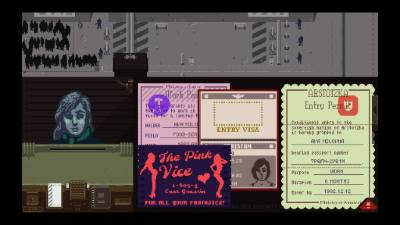Papers Please to Super Meat Boy indie game adventure
This decade has given us a lot of great games, which in the future will be talked about as the heritage of the industry. And in many ways it is worth noting the big studios, but the indie developers. A handful of enthusiasts, sometimes working for an idea for years, risk their well-being for one purpose - to make the game. One that is beyond the power of anyone but them.
When the editors began to compile a list of the most-most, there were so many applicants that it would be simply embarrassing to throw out at least one of them. But we still had to: out of a hundred-odd projects, we selected almost two dozen. There is no first and last place in this text, as well as those who have not reached quite a bit - each of the games mentioned has contributed to the industry.
Tackling the development of Super Meat Boy, Tommy Refenes and Edmund Macmillen set themselves an extremely clear task: they just wanted to make "their Super Mario Bros.". However, in fact, Team Meat managed to accomplish something much more - she breathed new life into the genre itself; it was she who showed many indie developers that the demand for truly complex games has always been and always will be - it is all about performance. Super Meat Boy packed the complexity of the old platformers into a very compact shell, throwing away everything unnecessary: there were only a meat boy, the love of his life and a billion circular saws on the way to the goal. Still, “just” doesn't mean “easy.”
Hotline Miami is a real workshop on how to make a player feel like an animal. How to imperceptibly immerse him in a completely different state of reason, in a trance. When a stranger in a rooster mask asks if you like to hurt other people, do not be fooled - the question is rhetorical. Of course I like it! Moreover, you do not even need a reason - if only the process brings pleasure. And the studio Dennaton Games knows how to deliver it: the developers with their bare hands squeeze out the adrenaline from the player to the last drop. Especially when, ten attempts later, the last pixel mafia falls into a pool of blood and the music that hit on the ears breaks off abruptly.
The Swedes from Frictional Games for many years have become trendsetters in the horror genre, having got to the bottom of the simple truth: we are not afraid of the monsters themselves, but of what will happen if they catch us. That is why in Amnesia: The Dark Descent from nightmare creatures you can only run away or hide; even looking at them is fraught with problems - if not for physical health, then for mental. Having made the player powerless in the face of danger, the developers managed to twist the degree of paranoia to the maximum: in Amnesia there is no inventory management or combat system. Only you, a huge abandoned castle full of puzzles, and the darkness from which a frail oil lamp hardly rescues. In short, the concept is simple, but insanely effective - that's why it was picked up by an army of imitators.
Of all the video games, both indie and large-budget, that have been released over the past ten years, The Stanley Parable can be safely called one of the most extraordinary (if not the most). Because this is no game at all - it is an essay. A sparkling, ironic reflection on freedom of choice, filed in the form of a story about the office workdays of the faceless Stanley, whose actions are dictated by an invisible narrator. That's just you, the player, not Stanley, and you have the opportunity to choose. Is it worth obeying the orders of the narrator? What will happen if you do everything contrary to the instructions? Is it possible to “break” the game and take the voice-overs by surprise? Alas, it is impossible - but this is the essence. The creators of The Stanley Parable, Davy Riden and William Pugh, masterfully scoff at themselves, and about their audience, and about games as such. Having been in the shoes of Stanley, you are unlikely to be able to look at interactive art as before.
Papers, Please (2013)
Take documents, check them, put a stamp, give documents; from nine to five, without days off. Papers, Please can hardly be called fascinating or exciting: like working with papers in real life, the everyday life of a customs officer on the border of Arstock is terribly monotonous. But the author of the game, Lucas Pope, uses a simulation of this mechanical work to show how insignificant matters of national importance are in the eyes of an ordinary person. Arstotska quarreled with a neighboring country and tightened the visa regime?
Great, now I’ll have to deal with paper more. A suicide bomber broke into the checkpoint? Horror, of course, do not wait for compensation for an interrupted working day. One stamp in a passport can change the fate of a stranger - but is it really so important when your own family barely makes ends meet? There is no need to be a highbrow critic to understand the message, but this Papers, Please is beautiful: she discusses complex topics with very simple means.
Earning Money from your indie games;
My first Pixel Art Experience





Comments
Post a Comment